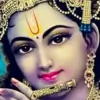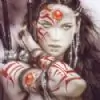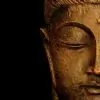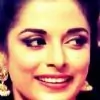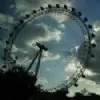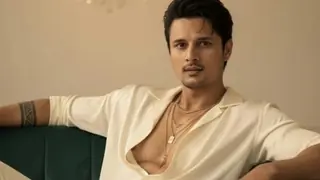The Kauravas and Pandavas learned the art of using weapons first from Kripacharya and then from Dronacharya. When they graduated from the school of Dronacharya, a huge event was organized for all the people of Hastinapur including the masses living in the villages and the royals of the Palace. Dhritarashtra, Gandhari, Bhishma, Kunti, Vidura, Kripacharya and Dronacharya and others were present for the event to display the skills of the princes.
The Kauravas were good but the Pandavas excelled. The large enthusiastic crowd was lost in wonder and admiration at Arjuna's superhuman skills with his bow and arrows. Duryodhana's barometer of rage, envy and jealousy was steadily climbing. By the time the sun was ready to set, Duryodhana was fuming with jealousy at all the admiration Arjuna was getting. Just then there came a loud compelling sound like that of thunder made by clashing weapons from the main entrance to the arena. From the cloud of dust there emerged, a young man wearing shining armor and earrings that shone like bright sun. He came face to face with Arjuna with his whole body expressing a challenge to Arjuna. Instinctively, the rest of the Pandavas gathered around Arjuna. Little did they know the irony of fate that they were standing in challenge in front of the eldest son of Kunti and God Sun. It was none other than Karna.
Karna gave a careless bow and salutations towards Kripacharya and Dronacharya and then towards the royalty. With a voice like rumbling thunder, he addressed Arjuna, "Arjuna, I can show greater skills at archery than you have." With careless ease Karna repeated all the feats of Arjuna. Duryodhana was overjoyed at the appearance of this unexpected good fortune. He embraced Karna with all the love of a long lost brother, "Who ever you are, fortune has sent you to me. Me and my hundred brothers are at your command."
While love flooded Duryodhana's heart, blazing wrath filled in Arjuna, as he felt affronted. He stood stately over Karna and exclaimed, "Who ever you are, you shall be slain by me and go to hell for intruding uninvited."
Karna gave a mirthless laugh, "This arena is not open just for you Arjuna. What is the use of showing off skills when they cannot be compared with any one else's. Talk is the weapon of the weak, send arrows instead of words."
Arjuna hastily bowed to his teachers and then embraced his brothers, as he prepared himself to the challenge. Karna took leave of the Kauravas and stood in front of Arjuna in combat. Lord Indra, the god of the thunderclouds and Arjuna's father, and the Sun god came at once in the sky to encourage their progeny.
Meanwhile, the moment Karna entered the arena, Kunti recognized him as her first born. As Arjuna and Karna became ready for the combat Kunti fainted. When she regained her consciousness, she was stupefied in anguish and was at a loss. She confided in Vidura the true identity of Karna and sought to stop this confrontation.
Kripacharya, who was well versed in the rules of the single combat, came over as the referee. Before beginning the combat he addressed Karna, "Youth, what is your name and what is your lineage? We cannot go forward without knowing this information. Arjuna is a prince and cannot engage in single combats with unknown adventurers" At the mention of lineage, Karna bowed down his head, downcast, like a lotus in rain, for all his life he was thwarted in his attempts for being a charioteer's son. He braced himself for the insults to follow.
Duryodhana came to his rescue,"We all know this youth matches Arjuna in skills. If the combat cannot take place merely because he is not a prince, that can be remedied easily. I proclaim from hence forth, this youth is King of Anga. I shall perform all the rites and rituals necessary to give him sovereignty over the kingdom of Anga."
It seemed that a combat between the youthful warriors was inevitable and was about to commence when the Charioteer Adhirath entered the arena. He was the foster father of Karna and was now shaking with fear at the impudence of his son to challenge the royal prince. As soon as Karna saw Adhirath, he bowed his head and gave the salutations to his father.
Bheema jeered at Karna, "King of Anga indeed, you are but a son of a charioteer. You don't need a royal insignia you need a whip to drive the horses or may be a brush to clean the horses. You are fit to rule the stables not the kingdom of Anga." Karna's lips trembled in anguish at this outrageous speech. Before Karna could speak anything, Duryodhana spoke indignantly, "Such speech is unworthy of you Vrikodara. Valor makes Kshatriyas, Kshatriyas do not make valor. The exercise of tracing one's lineage is meaningless. I can give you hundreds of instances of great men of humble births. Why awkward questions may be asked about your own origin. Look at Karna, his armor, his earrings, his build, confidence and the way he carries himself. I am certain there is a certain mystery behind him. Lion is not born to antelopes.Unworthy of ruling Anga did you say, I contest that he is worthy of ruling this whole world." Duryodhana whisked Karna in his chariot and drove away from the arena.
The sun set and a confrontation between the two sons of Kunti Karna and Arjun was avoided for a day.
Karna wanted nothing more than a show down with Arjuna and win. This desire was fueled even more by Duryodhana. Karna felt a certain loyalty towards Duryodhana after the unexpected and affectionate display of friendship by Duryodhana. He wanted to learn about the all powerful "Brahmastra", the equivalent of today's nuclear bomb. He went to Parsurama to learn about it. Parsurama was known for his dislike of the Kings and the warriors. Karna hid his identity as a charioteer's son because the world always ridiculed his ambition for the best warrior because of his parentage. He learned the art from Parsurama and Parsurama in turn was very pleased with his disciple. Indra in heaven knew Karna had learned the Brahmastra only to use it on Arjuna.
One day, Parsurama was sleeping with his head on Karna's lap. Indra took the form of a wasp and started to drill a hole in Karna's thigh. Karna tried to shoo ti away but the wasp was determined. Karna could not move without waking up his guru. As the wasp drilled the hole and warm blood started to trickle,it fell on Parsurama and he woke up. He saw what had happened. Parsurama was furious, "Karna you no Brahmin boy, only Kshatriya can bear the pain you are bearing. You have tricked me and learned the knowledge by deceit. I curse you that when you need it the most, you will nor be able to remember anything you have learned from me." Karna stood aghast, he pleaded Parsurama, "I am not a Brahmin, but I am not a Kshatriya either. I am a sutaputra (charioteer's son). I had to lie because all my life I was denied education because of my lineage."
Parsurama's anger subsided a little bit after knowing that he was not a Kshatruya. He liked Karna too, "Son, I cannot take back my curse, and I have cursed you rather harsh. In return, I will give you my Vijaya bow. Take it and go back home."
Karna took the bow and started back home. On the way, he decided to test the new bow. He stretched an arrow on it and carelessly without aiming at any particular target, he shot the arrow. The arrow stuck a cow and killed it. The owner of the cow was furious at Karna's callousness. "You have killed a cow that did not threaten you, you were displaying your skills on someone who had no weapon. You too shall be killed defenseless, when you have put down your weapons."
These fatal curses set the stage for Karna's death in the Mahabharata war. He always remained a faithful friend to Duryodhana. He is the tragic hero, a gifted, righteous and a brave hero, known especially for his generosity. He fought impossible odds all his life and died with courage, valor and honor. He is also an example of misplaced loyalty that doomed him.
Source: https://www.india-intro.com/religion/mahabharat.html




